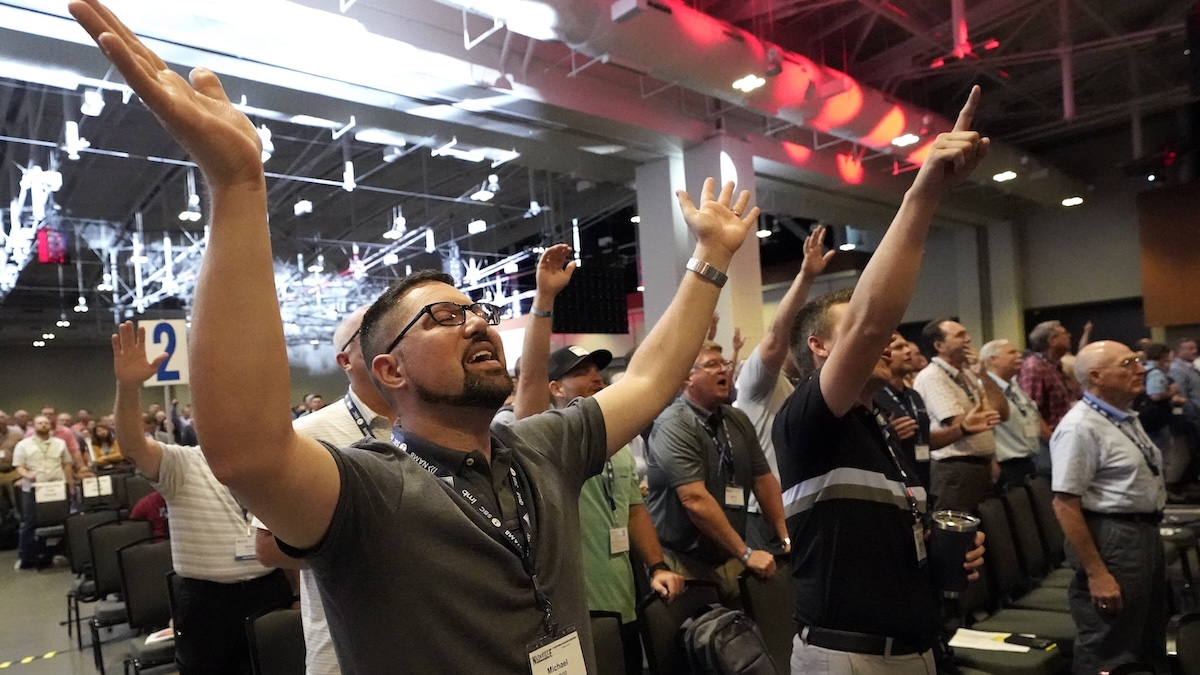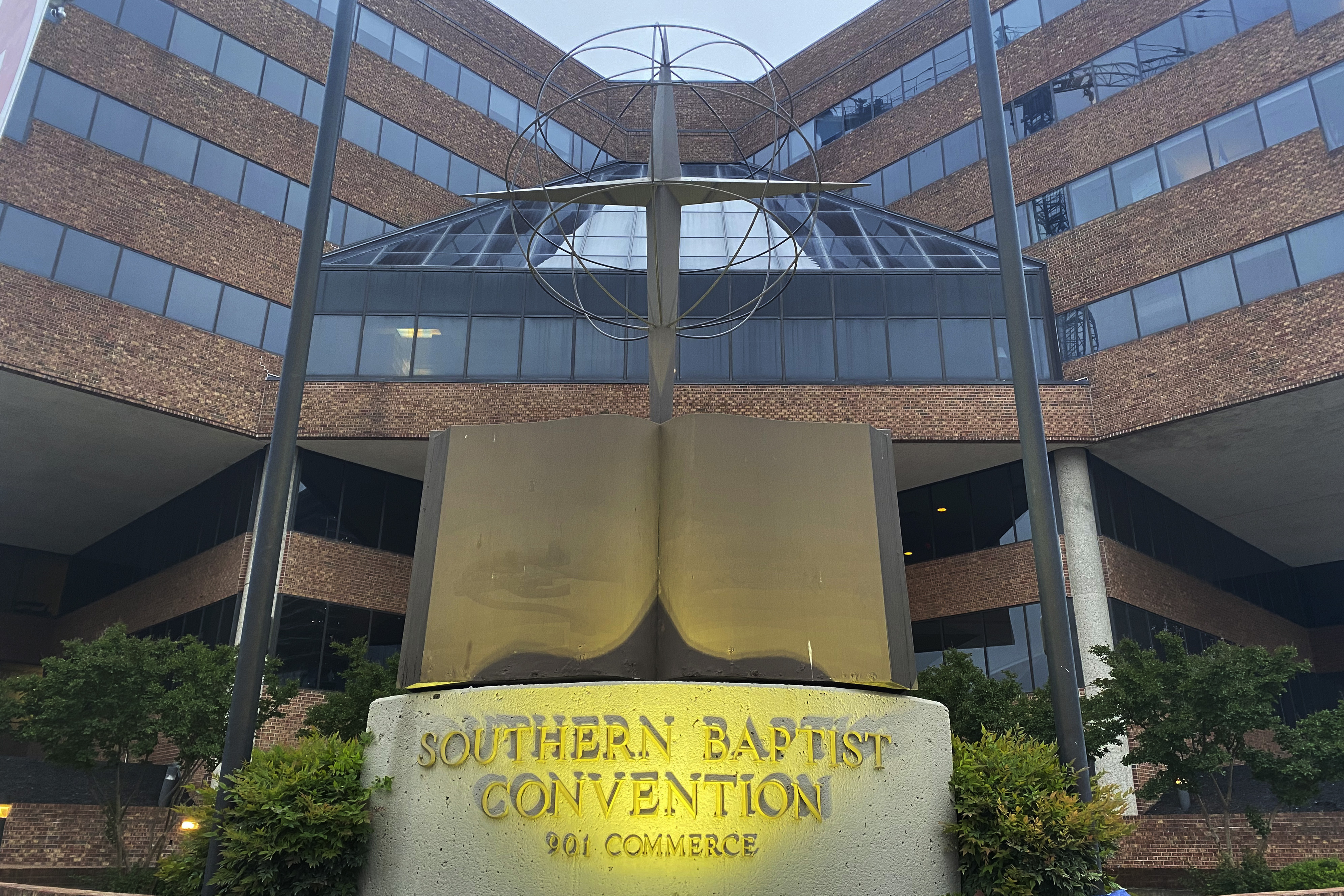
Southern Baptists narrowly rejected a proposal Wednesday to enshrine a ban on churches with women pastors in their constitution after opponents argued it was unnecessary because the denomination already has a way of ousting such churches.
The measure received support from 61% of the delegates, but it failed to get the required two-thirds supermajority. The action reversed a preliminary vote last year in favor of the official ban.
But it still leaves the Southern Baptist Convention with its official doctrinal statement saying the office of pastor is limited to men. Even the opponents of the ban said they favored that doctrinal statement but didn’t think it was necessary to reinforce it in the constitution.
Opponents noted that the SBC already can oust churches that assert women can serve as pastors — as it did last year and again Tuesday night.
Get top local stories in DFW delivered to you every morning. >Sign up for NBC DFW's News Headlines newsletter.
The vote was perhaps the most highly anticipated of the annual meeting, reflecting years of debate in the United States’ largest Protestant denomination. It was the final day of the SBC’s two-day annual meeting in Indianapolis where Southern Baptists have also elected a new convention president and approved a nonbinding resolution, cautioning couples about using in vitro fertilization.
In the resolution, messengers urged couples to “consider the ethical implications” of reproductive technologies like IVF. It has become a prominent issue in the wake of a IVF controversy in Alabama, which shielded IVF providers from prosecution and civil lawsuits after a state Supreme Court ruling said frozen embryos are children.
The SBC resolution agrees that embryos are children, regardless of location in or outside the womb. The resolution expressed alarm over the fact that IVF treatment commonly produces surplus embryos that are frozen, with “most unquestionably destined for eventual destruction.”
While not outright opposing IVF, the resolution also denounces medical experimentation on frozen embryos as well as any use of “dehumanizing methods for determining suitability for life and genetic sorting.”
It expresses sympathy with couples struggling with infertility but urges them to weigh the issues. It also encourages couples to adopt frozen embryos.
Some messengers gave impassioned defenses of the technology, saying it helped couples bring children into the world, but others said the destruction of frozen embryos outweighs any benefits from IVF.
“Right now we’re trying to open the conversation, remind Southern Baptists of our long-held beliefs of the sanctity of human life,” said Kristen Ferguson, chair of the committee on resolutions. “So in the future, we fully anticipate that you may see much stronger language ... but we are not speaking to that at this time, because Southern Baptists aren’t ready to speak to that yet”
Earlier in the day, the much-watched proposed amendment, which received preliminary approval last year, would have formally excluded churches that have women in any pastoral positions, from lead pastor to associates, or even affirms them in that role. Supporters believe it is biblically necessary, estimating hundreds of Southern Baptist churches have women in those roles.
Since 2000, the SBC’s nonbinding statement of faith has declared that only men are qualified for the role of pastor. It’s interpreted differently across the denomination, with some believing it doesn’t apply to associate pastors so long as the senior pastor is male.
The rejected amendment would have said any church deemed in “friendly cooperation” — the official term for SBC affiliation — must be one that “affirms, appoints, or employs only men as any kind of pastor or elder as qualified by Scripture.”
Opponents argued the convention already has the power to remove churches over this issue, and the amendment will have unintended consequences, including disproportionately affecting Black Southern Baptist congregations, which tend to have women on their pastoral staffs.
But the motion went swiftly to a vote after only brief debate.
Ryan Fullerton, pastor of Immanuel Baptist Church in Louisville, Kentucky, said the measure is “not about preventing women from exercising their gifts” in the church, in roles on church staff such as “children’s ministers.” But he said the Bible is clear that the office of pastor is for men.
Spence Shelton, pastor of Mercy Church in Charlotte, North Carolina, argued the measure was unnecessary.
He noted that the convention voted to affirm the ouster of a historic Virginia church Tuesday and two other churches last year, including the California megachurch Saddleback, which all have women pastors and affirmed they could hold top pastoral positions.
The stated citation for ousting those churches was an existing part of the constitution — that they don’t have a faith and practice that “closely identifies” with the Baptist Faith and Message, the document approved in 2000 that includes the affirmation that the pastoral position is reserved for men.
“Y’all, we have shown the mechanisms we currently have are sufficient to deal with this question,” Shelton said.
Mike Law, pastor of Arlington Baptist Church in Virginia and author of the amendment, cited a report that there are about 1,800 women pastors working in the denomination. He cited Bible verses limiting the pastoral office to men while saying women can serve in other roles.
“Our culture may see this prohibition as harsh, but our God is all wise, and wrote this word for the flourishing of both men and women,” he said.
Law said in a statement afterward that while the result is disappointing, he took heart that supporters were in the majority, “and that is something we can build on.”
Dwight McKissic, a Black pastor from Arlington, Texas, who supports women in ministry under a male pastor's leadership, applauded the rejection of the amendment.
In a post on X, formerly Twitter, he said that God loves women “too much to allow unbiblical restrictions, that violates local church autonomy, to disallow women from receiving and deploying spiritual gifts. ... Male supremacy didn’t rule the order of the day.”
The denomination can’t tell its independent churches what to do or whom to appoint as a pastor. But they can say which churches are in and which are out.
Last year, Southern Baptists refused to take back Saddleback, one of the convention’s largest congregations, and a small Kentucky church after the denomination's Executive Committee ousted them over the issue.
Both churches, which had women in top pastoral positions, appealed their ouster to the 2023 annual meeting and were overwhelmingly rejected by the delegates. A similar scenario played out in Indianapolis on Tuesday, when messengers voted overwhelmingly to kick out First Baptist Church of Alexandria in Virginia, which has a woman in an associate position and also asserted that women can hold the top job.
Delegates also elected a North Carolina pastor and longtime denominational statesman to be the next president of their convention in a contest between six candidates that went into two run-off votes.
Clint Pressley, who is senior pastor of Hickory Grove Baptist Church in Charlotte, will be the next Southern Baptist Convention president after winning 56% of votes in the final run-off race.
The SBC president — one of the most prominent faces of the conservative evangelical network of churches — presides over the annual meeting and appoints members to the denomination’s committees.
Pressley earned a master of divinity from New Orleans Baptist Theological Seminary in Louisiana, one of the SBC’s official seminaries. He has led Hickory Grove since 2011 after pastoring churches in Alabama and Mississippi. Pressley was first vice president of the SBC in 2014-15 and served on numerous other denominational boards.



